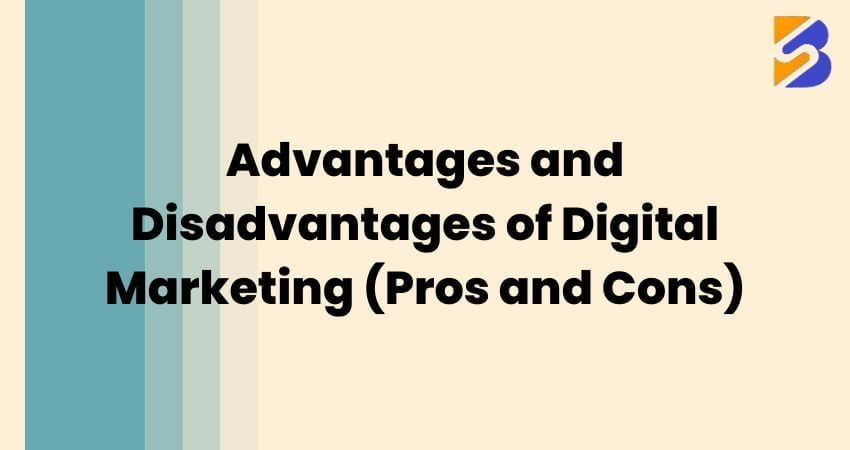Digital marketing has revolutionized the way businesses approach marketing and advertising. It is a vast field that includes various strategies such as social media marketing, email marketing, search engine optimization, content marketing, and more. With the rise of digital marketing, businesses can reach their target audience more efficiently and effectively. However, like any other marketing strategy, digital marketing has its benefits and drawbacks. In this blog, we will explore the pros and cons of digital marketing.
Advantages of Digital Marketing
Digital marketing offers numerous advantages for businesses seeking to grow and succeed in the digital age. Here are some of the key advantages of digital marketing:
Cost-effective
One of the most significant advantages of digital marketing is that it is cost-effective. Traditional marketing methods, such as print ads and billboards, can be very expensive. In contrast, digital marketing allows businesses to reach their target audience at a lower cost. For example, businesses can use social media platforms to promote their products or services without spending a lot of money.
Measurable Results
Digital marketing provides measurable results, which makes it easier for businesses to track their progress. This means that businesses can easily see what is working and what is not, and adjust their marketing strategies accordingly. With tools like Google Analytics, businesses can track website traffic, conversion rates, and other metrics to evaluate the success of their marketing campaigns.
Increased Reach
Another benefits of digital marketing is that it can reach a larger audience. With the rise of social media platforms, businesses can now reach customers all over the world. This makes it easier for businesses to expand their customer base and increase their sales.
Personalization
Digital marketing allows businesses to personalize their marketing messages. With tools like email marketing, businesses can send personalized messages to their customers based on their preferences and behaviors. This makes it easier for businesses to build relationships with their customers and increase customer loyalty.
Flexibility
Digital marketing is flexible, which means that businesses can adjust their marketing strategies quickly. For example, if a business sees that a particular marketing strategy is not working, they can quickly make changes to their strategy. This allows businesses to stay agile and adapt to changing market conditions.
Disadvantages of Digital Marketing
While digital marketing offers numerous advantages, it also comes with certain disadvantages that businesses should be aware of. Here are some of the key disadvantages of digital marketing:
Overreliance on Technology
One of the disadvantages of digital marketing is that it relies heavily on technology. If a business’s website goes down, or if there is a technical glitch in their marketing campaigns, it can have a significant impact on their marketing efforts. This means that businesses need to have a solid understanding of technology to effectively execute their digital marketing strategies.
Information Overload
With the rise of digital marketing, customers are bombarded with information from multiple sources. This means that businesses need to find ways to cut through the noise and stand out from their competitors. This can be challenging, especially for small businesses that do not have the resources to invest in extensive marketing campaigns.
Lack of Personal Touch
While digital marketing allows businesses to personalize their marketing messages, it can lack the personal touch that traditional marketing methods provide. For example, a customer may feel more valued if they receive a handwritten note from a business rather than an automated email.
Security Concerns
Digital marketing also poses security concerns, especially when it comes to customer data. Businesses need to ensure that their customer data is secure and that they comply with data protection regulations. Failure to do so can result in significant fines and damage to a business’s reputation.
Short Attention Spans
Finally, digital marketing can be challenging because customers have short attention spans. With so much information available, customers may quickly lose interest in a business’s marketing messages. This means that businesses need to find ways to capture and maintain their customers’ attention.
Conclusion
Digital marketing has its advantages and drawbacks. While it is cost-effective, provides measurable results, and has increased reach, businesses also need to be aware of the potential drawbacks, such as overreliance on technology, information overload, lack of personal touch, security concerns, and short attention spans.
Ultimately, the success of digital marketing depends on how businesses approach it. By leveraging the advantages of digital marketing while being aware of its potential drawbacks, businesses can create effective marketing campaigns that reach their target audience and drive sales.
To mitigate some of the disadvantages of digital marketing, businesses can also use a multi-channel approach that combines digital marketing with traditional marketing methods. For example, a business can send a personalized handwritten note to a customer after they make a purchase online. This provides a personal touch that can help build customer loyalty.
In conclusion, digital marketing is a powerful tool that can help businesses reach their target audience and drive sales. However, it is essential to understand the advantages and disadvantages of digital marketing and use a multi-channel approach to create effective marketing campaigns. By doing so, businesses can stay competitive in today’s digital landscape and continue to grow their customer base.



